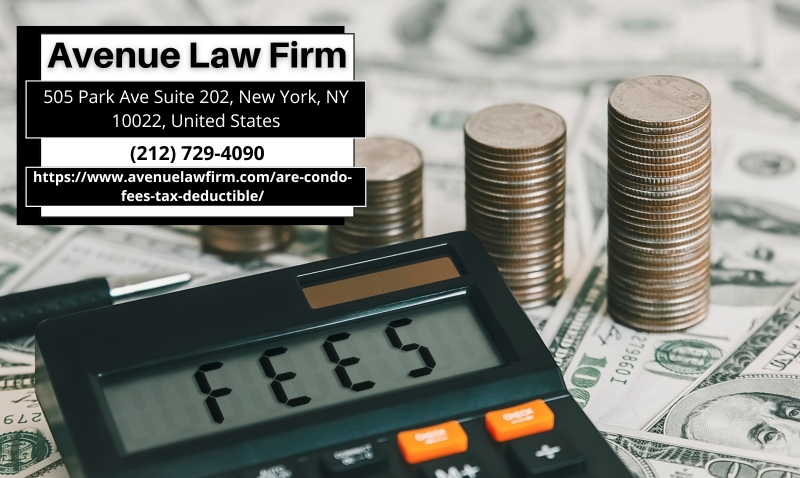NYC condo real estate attorney Peter Zinkovetsky (https://www.avenuelawfirm.com/are-condo-fees-tax-deductible/), of Avenue Law Firm, recently addressed a question that is top-of-mind for many condo owners: Are condo fees tax deductible? Owning a condominium in New York City is accompanied by the inevitable expense of condo fees, also known as common charges. In the comprehensive discussion, Zinkovetsky explains the purpose of these fees, their financial implications, and their tax treatment, shedding light on a subject that is both complex and significant for condo owners in NYC.
According to Zinkovetsky, condo fees serve as a fundamental component of condominium ownership, covering essential services such as building maintenance, staff salaries, and upkeep of shared amenities. “These charges maintain the quality and safety of the building,” the NYC condo real estate attorney notes, emphasizing that they are vital for helping ensure a pleasant living environment. However, Zinkovetsky points out that while these fees are critical for property upkeep, they differ significantly from property taxes, which are often eligible for deductions.
The NYC condo real estate attorney goes on to highlight the distinction between common charges and similar fees such as homeowners’ association (HOA) fees, as well as the varying factors that influence their cost. Zinkovetsky elaborates that these fees are determined by a building's size, location, amenities, and management structure. For example, a unit's size and location within a building often play a significant role in determining the monthly charges, with premium features such as better views or additional amenities like gyms and pools driving costs higher.
Condo fees, Zinkovetsky explains, are categorized as personal expenses rather than public contributions, which makes them ineligible for tax deductions under federal law for most primary residences. These fees support private building operations rather than public services, such as those funded by property taxes. “Common charges cover services such as pest control, trash removal, and shared utility expenses, none of which qualify for federal tax deductions,” states Zinkovetsky.
However, there are exceptions to this general rule. Zinkovetsky advises that condo owners using their units as rental properties may be able to deduct the portion of condo fees directly tied to income generation, such as maintenance costs for shared areas utilized by tenants. Similarly, if a portion of the condo is used for business purposes—such as a home office—there may be a proportional deduction available for related expenses.
“Maintaining detailed records and consulting with professionals are key steps to maximize deductions and maintain compliance,” says Zinkovetsky, stressing the importance of tailored advice when managing the tax aspects of condo ownership.
In addition to routine common charges, condo owners may encounter special assessments imposed by their condo board for significant projects, such as major repairs or emergency expenses. Zinkovetsky notes that these assessments, while mandatory, are also not deductible for primary residences. However, as with regular condo fees, deductions may be available for rental properties or business-use scenarios, depending on the nature of the expenses.
Condo owners in NYC must also account for the separate but equally crucial category of property taxes. Unlike condo fees, property taxes contribute to public services and are often deductible, subject to the State and Local Tax (SALT) cap. Zinkovetsky advises that understanding the distinction between these two expense categories is vital for effective financial planning and budgeting.
For NYC condo owners, managing the financial obligations of ownership requires a proactive approach. Zinkovetsky recommends staying informed about building budgets and participating in condo board meetings to understand the allocation of funds. Engaging with professionals, such as real estate attorneys and tax advisors, can also help owners optimize deductions and avoid potential pitfalls.
“Being proactive about your financial responsibilities not only helps ensure compliance but also safeguards your investment in the long term,” Zinkovetsky concludes.
Owning a condo in New York City involves more than just purchasing a unit—it includes managing ongoing costs such as common charges and property taxes. Understanding the tax treatment of condo fees and seeking appropriate advice can allow owners to make informed decisions that align with their financial goals.
About Avenue Law Firm:
Avenue Law Firm, located in New York City, is dedicated to providing comprehensive legal services to condo owners, buyers, and sellers. With a focus on real estate transactions and property management issues, their team, led by Peter Zinkovetsky, can offer tailored solutions to handle the complex aspects of NYC real estate.
Embeds:
Youtube Video: https://www.youtube.com/watch?v=sDKcMDsz5Ac
GMB: https://www.google.com/maps?cid=14223199020890935024
Email and website
Email: peter@avenuelawfirm.com
Website: https://avenuelawfirm.com/
Media Contact
Company Name: Avenue Law Firm
Contact Person: Peter Zinkovetsky
Email:Send Email
Phone: (212) 729-4090
Address:505 Park Ave Suite 202
City: New York
State: New York 10022
Country: United States
Website: https://avenuelawfirm.com/

